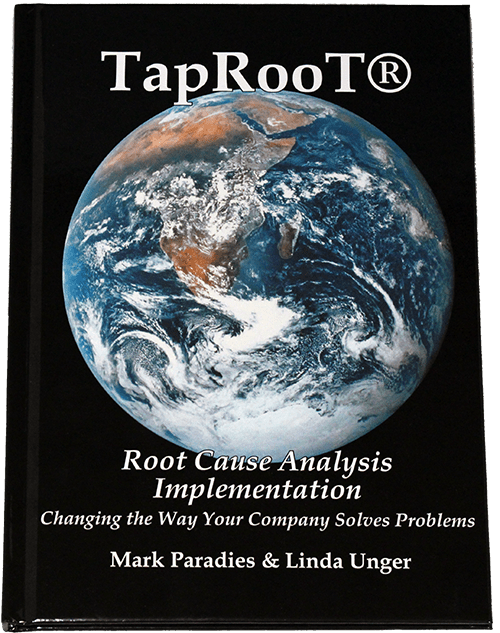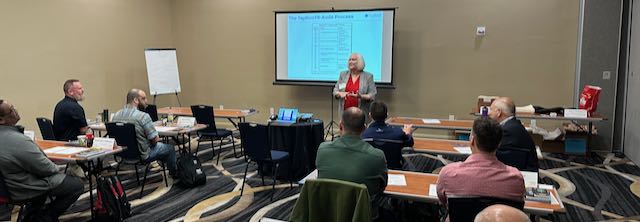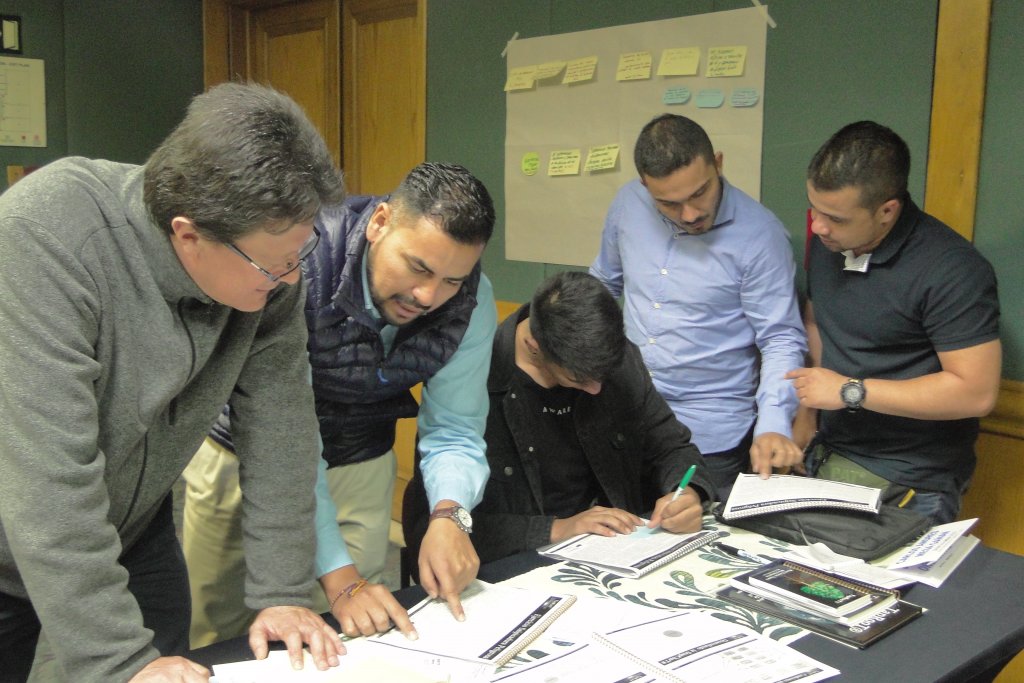Improving Incident Investigation Skills

Improving Incident Investigation Skills
A common question that I’m asked is:
Where do I start, and what do I need to do
to improve the incident investigation skills
of the people who work for me?
Of course, the answer depends on the current skill level of your investigators.
Read on for ideas about:
- Where to start
- Going beyond the basics
- Continuous improvement
- Benchmarking your people’s skills against industry best practices
That should help you accomplish your goal of finding and fixing the root causes of incidents.
Where to Start

Since you are reading this article, you are probably signed up for the Root Cause Network™ Newsletter. That is a good first step to finding out more about improving incident investigation and RCA skills. If you aren’t registered for this free newsletter, sign up using the form at the bottom of this page.
Next, I’ve heard people recommend that for untrained people, you should start with the basics. That’s a good idea! But then they recommend something like holding training on the 5-Whys technique. That’s a big mistake.
Why? Because the training teaches bad habits.
Why do I say that 5-Whys training teaches bad habits? If you have been reading my articles, you already know the answer to this question. It can be summarized in a few bullets:
- 5-Whys is compromised by Confirmation Bias.
- 5-Whys don’t lead you beyond your current knowledge (especially for human error). (You get the same old corrective actions you already tried that failed.)
- 5-Whys often leads to the single cause misconception.
- Results aren’t repeatable (reproducible).
For details about why 5-Whys is not a good practice, read this article that was published in Quality Progress:

Is there training that teaches the fundamentals of incident investigation and root cause analysis that doesn’t start with bad practices (like 5-Whys)? Yes! The 2-Day TapRooT® Root Cause Analysis Course was designed to teach the essential techniques that people need to find the root causes of precursor incidents. These techniques can even be presented in a 3-day virtual course.
By holding this advanced training, you are starting with industry best practices that can be built upon to yield exceptional results.
The 2-Day TapRooT® Course focuses on tools to find root causes. It assumes that the people being trained know the basics of collecting evidence and interviewing people involved in an incident. What if your folks don’t have these skills? You can add a 2-Day (or 1-Day) Effective Interviewing and Evidence Collection Course to the 2-Day TapRooT® Course to provide the skills your investigators need.
Combining the 2-Day TapRooT® Root Cause Analysis Course and the Effective Interviewing and Evidence Collection Course is a great way to start your investigators on the path to success.
Would you like to compare the results of starting with 5-Whys with those of starting with TapRooT® Root Cause Analysis Training? Then read this article:
Comparing 5-Whys with Advanced Root Cause Analysis
The Basics Are a Great Start – What’s Next?
The 2-Day TapRooT® Root Cause Analysis Class is a great start for improving incident investigation skills. But I am often asked…
What’s Next?
Why do people ask this question? Because:
- Investigators investigating major accidents or complex problems may need additional incident investigation skills.
- Investigators may need coaching to continuously improve their incident investigation skills.
- Investigators may need refresher training if they don’t get much practice using their root cause analysis and incident investigation skills.
- Your investigators may be focused on equipment-related problems and need equipment troubleshooting skills.
Let’s look at ideas to help with each of these issues.
Developing Advanced Incident Investigation Skills
Every company needs investigators with the skills to investigate complex issues and major accidents. The 2-Day TapRooT® Root Cause Analysis Course is a start, but we designed another course to teach both the essential techniques of root cause analysis/incident investigation and the advanced techniques needed for investigating major accidents and complex issues – the 5-Day TapRooT® Advanced Root Cause Analysis Team Leader Training.
What is in the 5-Day TapRooT® Course? Here is an outline:
Day One (8:00 am to 5:00 pm)
- Class Introductions and TapRooT® Introduction
- TapRooT® System Overview – What You’ll Be Learning
- SnapCharT® Basics – Gathering Information
- SnapCharT® Exercise – Practice
- Causal Factors – Identifying the Errors
- Root Cause Tree® Diagram – Eliminating Blame
- Root Cause Tree® Exercise – On Your Own
- Corrective Actions – Developing Fixes
- Corrective Action Exercise
Day Two (8:00 am to 5:00 pm)
- Software Tips
- Generic Causes – Systemic Problems
- Enhanced Corrective Actions
- Preparing for Your Investigation
- Collecting Information
- Interviewing
- Interviewing Exercise
- Interviewing Exercise (RCA)
Day Three (8:00 am to 5:00 pm)
- Management System & Changing Behavior
- Equifactor® Troubleshooting
- Human Engineering
- CHAP & Exercise
- Change Analysis
- Change Analysis Exercise
- Improving Procedures
- Putting It All Together
- Work Direction & Exercise
Day Four (8:00 am to 5:00 pm)
- Human Factors Jeopardy
- Proactive Improvement
- Auditing Using Safeguard Analysis
- Water Hammer Exercise
- Analyzing Training Problems
- Grading Investigations
- Presenting to Management
- Frequently Asked Questions
- Start Final Exercise (SnapCharT® Diagram)
Day Five (8:00 am to 1:00 pm)
- Final Exercise: Safeguards Analysis
- Final Exercise: Define Causal Factors
- Final Exercise: Find Root Causes
- Final Exercise: Find Generic Causes
- Final Exercise: Develop Fixes
- Final Exercise: Presentations
That’s a great way to train your senior investigators and the folks who will be coaching your junior investigators (see more about coaching your junior investigators below).
Often, people send those who need this advanced training to one of our public TapRooT® Courses. When and where do we hold these courses? See the dates and worldwide locations of our 5-Day TapRooT® Courses at this link:
Hopefully, you never have a major accident (no fatalities or significant injuries). After all, that is the goal of implementing advanced root cause analysis and effectively fixing precursor incidents to prevent major accidents. But if you do have a major accident, you need to be prepared to investigate it.

Coaching Your Investigators to Improve Their Skills
How can you coach your investigators to improve their incident investigation skills? Easy! We have built a system for grading investigations into the TapRooT® Software. This grading system can be used by your investigators to measure their own performance or it can be used for peer review and coaching.
Read more about grading investigations and coaching your investigators HERE.
Having a consistent numerical scoring of investigations is a great way to measure your site’s progress in improving incident investigations.
We discuss establishing a peer review committee of experienced investigators who have taken the 5-Day TapRooT® Course in Book 2: TapRooT® Root Cause Analysis Implementation – Changing the Way Your Company Solves Problems.

Grading investigations and providing coaching using a peer review committee is an effective way to develop investigators’ skills, measure improvement, and have better quality investigation/presentations for management review.
Practice & Refresher Training
As performance improves, companies eliminate serious injuries and fatalities and have fewer precursor incidents. See the success stories that show these improvements HERE.

When incidents are reduced, investigators don’t have the opportunity to practice their root cause analysis and incident investigation skills. What can you do to keep your investigators’ skills current? Here are three ideas…
1. Have them practice their skills by performing proactive audits/observations.
Having your investigators perform monthly audits/observations using their TapRooT® Skills can help them maintain your company’s safety, quality, and operation/maintenance improvements while maintaining their incident investigation skills.
How do you use proactive audits/observations to proactively improve performance? That’s what we teach in the 2-Day Auditing & Proactive Improvement Using TapRooT® Course. See details about the course HERE.

2. Hold refresher training for your investigators.
We’ve developed a 1-Day TapRooT® Root Cause Analysis Refresher Training specifically to meet the challenge of maintaining investigators’ proficiency. Find out more about the training HERE.

Equipment Troubleshooting and Root Cause Analysis Skills
In 1997, we discovered that people interested in improving equipment reliability needed a special course that taught troubleshooting and root cause analysis. We worked with equipment reliability expert Heinz Bloch to develop the Equifactor® Equipment Troubleshooting Tables and the Equifactor® Equipment Troubleshooting and TapRooT® Root Cause Analysis Course.

If your investigators need equipment troubleshooting and root cause analysis training beyond the 2-Day TapRooT® Course, this is a great way to provide these advanced skills. See the course outline HERE. See our public course dates and locations HERE.
Benchmark Your RCA & Incident Investigation Skills at the Global TapRooT® Summit

Would you like to:
- Learn advanced root cause analysis skills?
- Network with industry leaders and benchmark your incidents investigations and root cause analysis with theirs?
- Learn the latest root cause analysis/incident investigation best practices?
- See how others have applied advanced root cause analysis to achieve success?
Then you should plan to attend the 2024 Global TapRooT® Summit.
There are seven different best practice tracks. They are:
- Improving Investigations & Root Cause Analysis
- Safety Improvement
- Maintenance & Reliability
- Improving Human Performance
- Better Improvement Programs & CAPA
- Psychology of Improvement
- Instructor Recertification
Plus, there are five Keynote Talks sharing information you need to make your improvement program more effective.
Before the Summit (on Monday and Tuesday), there are advanced courses to teach advanced root cause analysis and performance improvement skills. See the complete course list HERE.
Attending a pre-Summit Course and the Summit is probably the BEST way to advance your investigators’ skills and make your improvement programs world-class.
Don’t miss the 2024 Global TapRooT® Summit being held on April 29 – May 3 near Austin, Texas, at the Horseshoe Bay Resort.

Bringing a team of your investigators to pre-Summit Courses and the Summit is a great way to make a major impact on their incident investigation skills. Plus, you get discounts on the courses and the Summit when you register multiple people at one time.

That’s why it’s such a brilliant idea to bring a team of your investigators to the Summit. Simply REGISTER HERE.
Discuss Improving Incident Investigation Skills with Experts
One final idea. Would you like to discuss ideas about improving incident investigation skills with experts? Then contact our TapRooT® Implementation Advisors…

You can call them at 865-539-2139 or CLICK HERE to e-mail them with questions.
They will be happy to share best practices that they have seen implemented around the world.



